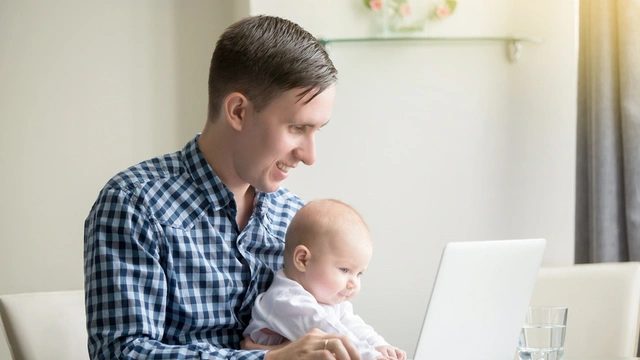If you’re responsible for a child, you may be eligible for an allowance of £25.60 per week for your oldest and £16.95 for any subsequent children.
There are many things that can influence your eligibility for Child Benefit, both when you first claim, and as time goes by.
Whether you're a new parent learning the system for the first time, or a seasoned guardian checking the rules, we'll highlight the various scenarios that can affect your eligibility.
Child Benefit is financial help for parents
Child Benefit is a payment you’re entitled to if you have children or dependants that meet the given criteria. It is usually received every four weeks, but can be paid weekly in some situations.
Understanding whether you qualify is essential to ensure you’re getting all the assistance available for your family.
Am I eligible?
You should be able to claim Child Benefit if you are a parent or guardian who is responsible for a child. This generally means that they live with you most of the time and you pay for their upkeep.
You will usually be eligible for Child Benefit if:
- Your child is under 16 years old: You’ll be able to claim providing you are paying equal to, or more than the amount of Child Benefit towards raising them.
- Your child is aged 16-20 and in full-time education: You could claim if your child is within this age range and in approved full-time education or training, e.g. A levels.
- You are fostering a child: Providing the local council is not paying anything towards the child’s accommodation or maintenance, you can claim Child Benefit for a fostered child.
- Your child is adopted: You can claim Child Benefit as soon as the child comes to live with you, regardless of whether the adoption process is complete. You can also contact HMRC to see if it’s possible to start receiving Child Benefit sooner.
- You are looking after someone else’s child: You may be eligible to receive Child Benefit while looking after someone else’s child, even if the agreement is not formalised. As with fostering, if the local council are paying towards the child’s maintenance, this could affect your eligibility. It’s important to note that Child Benefit can only be paid to one person per child.
- You are a British citizen living abroad: Depending where you live, and whether you are a Crown servant (e.g. a police officer or judge), it could still be possible to claim Child Benefit while living abroad.
- You have settled or pre-settled status under the EU Settlement Scheme: If you have settled status, you’re able to claim Child Benefit. If you have pre-settled status, e.g. permission to live in the UK for up to five years, you must meet certain criteria to be able to claim.
- You have recently moved to the UK: You must be able to prove that the UK is your main home and you have the right to reside here. In most cases, you will also need to prove that your child lives with you, but there are some exceptions.
In some cases, you can claim Child Benefit for a child who doesn’t live with you
If your child doesn’t live with you, then you may still be able to claim Child Benefit for them if you are paying for their upkeep. You will likely need to demonstrate that you are paying their costs.
Only one person can receive Child Benefit per child, even if multiple people claim. If the person your child lives with starts claiming Child Benefit for your child, then it’s likely they will be the one paid it. If you disagree with this decision, then you can appeal it with HMRC to make sure Child Benefit is received by the person most in need of help paying for your child’s upkeep.
Your eligibility for Child Benefit may change over time
There are situations that can change your eligibility for Child Benefit or affect how much you can claim. These may be temporary or permanent, and include:
- Your child is in hospital or care for a long time: Your Child Benefit could be affected if your child is in care for more than eight weeks, or hospital for more than 12 weeks.
- You have split up with your partner: Child Benefit can only be paid to one person per child. So if you’ve split from your partner and your child(ren) now live with them most of the time, they will usually be the person that Child Benefit is paid to rather than you.
- One of your children lives with you, and another with someone else: If you have two children who stay with separate parents, then each adult could claim and receive £25.60 for the child that lives with them. If you have more than two children, you would be entitled to claim £16.95 for the second and any other children that live with you.
- You have joined families with a partner: When two families join together, you can claim £25.60 per week for the eldest child in the household. Any other children qualify for £16.95 per week. This would mean only being able to claim one amount of £25.60, instead of the possibility of two previously.
When your eligibility will end
Your Child Benefit will stop automatically on 31st August on/after their 16th birthday. If you continue to claim Child Benefit for longer because your child is in full-time education, then payments will stop when they turn 20, or sooner if:
- Your child starts a job: Once your child begins paid work for 24 hours or more per week and is no longer in education or training, you will not be able to claim for them.
- Your child goes to university: You can’t claim Child Benefit if your child is studying an advanced course, e.g. a university degree.
- Your child starts an apprenticeship: Your eligibility to claim will stop if your child begins an apprenticeship in England.
- Your child receives benefits: If your child receives certain benefits themselves, e.g. Employment and Support Allowance, or Universal Credit, you can no longer claim Child Benefit.
You may be able to keep receiving Child Benefit after your eligibility has ended
In some situations, you may be able to keep receiving Child Benefit for a short period after your eligibility ends.
For example, if your child is 16-17 and leaves education to join a government sponsored careers service or the armed forces, you may be able to keep receiving Child Benefit payments for up to 20 weeks.
Or, if your child no longer lives with you and you’re not paying for their upkeep, you might be able to keep receiving Child Benefit for up to eight weeks, as long as nobody else claims for them in that time.
Read more to find out how much Child Benefit is worth and the ways to claim.
Zubin is a personal finance writer with an extensive background in the finance sector, working across management and operational roles. He applies his experience in customer communication to his writing, with the aim of simplifying content to help people better understand their finances.
![Email icon]()
Become a money maestro!
Sign up for tips on how to improve your credit score, offers and deals to help you save money, exclusive competitions and exciting products!
Find this useful? Share it with others!









